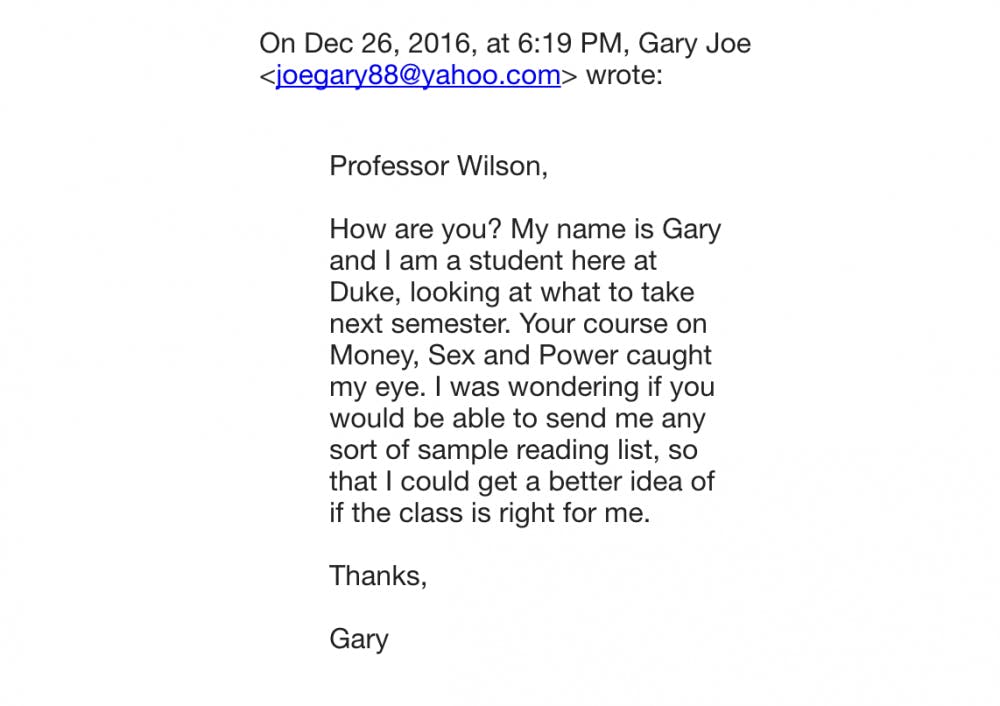When Ara Wilson, associate professor in women’s studies, received an email from a student interested in her class, she thought it was polite—but slightly odd.
"Gary Joe" asked to see a sample syllabus for her class on “Money, Sex and Power” in the gender, sexuality and feminist studies department Monday. The only problem? Gary Joe isn’t actually a Duke student.
During the past few days, several professors have received emails from “joegary88@yahoo.com” asking to see their syllabi. Duke’s IT Security Office sent out an alert Tuesday encouraging professors to ignore and delete the messages.
“Duke has no such student on record and the messages have all been nearly identical except for the name of the course,” the IT alert read. “This is not the first time this sender has attempted to obtain class information from Duke professors and these attempts will likely continue.”
It is unclear who is behind the emails or the motivation for them. The Chronicle emailed "Gary Joe" late Tuesday evening to no response, and then again early Wednesday morning. The second email failed to go through, however, and a mail delivery subsystem message reported that "this user doesn't have a yahoo.com account."
But some professors have speculated that the email might be a right-wing attempt to show liberal bias in Duke's curriculum. Wilson, for example, suggested that the number 88 could be a reference to neo-Nazi culture.
“This is a longer term issue where conservatives target liberal universities as a propagation of liberal ideas,” Wilson said. “My sense is that after the recent election, this will increase and intensify.”
Although he did not comment on potential explanations for the email, Michael Schoenfeld, vice president for public affairs and government relations, affirmed the University's commitment to open expression.
"Protecting the faculty’s freedom to teach, research and speak about complex and sometimes controversial subjects is one of our core values and will always be a top priority for the university," Schoenfeld wrote to The Chronicle. "The IT security office regularly puts out bulletins regarding suspicious emails that might be scams, phishing expeditions or viruses that come to their attention, and we encourage all members of the Duke community to pay attention to those alerts."
Aaron Griffith, a doctoral student in the Divinity School who will be teaching a course on “Religion and Mass Incarceration in America,” also reported receiving the email, which went to his spam folder. He said he was initially suspicious because the email was from a Yahoo account, not a Duke email address.
Then, he saw other professors post on Twitter about receiving the email, and he has heard of more than a dozen of his colleagues getting similar requests.
Griffith said that he felt the courses being targeted have “a certain progressive vibe” to them, adding that he has not heard of classes like Statistics 101 having their syllabi requested. If that in fact is the intent behind the emails, he said, it is ironic as his course features several conservative authors.
“I'm happy to share my course reading list with anyone who asks for it," he said. "I just would prefer they didn't misrepresent themselves when they do."
Christine Folch, an assistant professor of cultural anthropology, received an email from "Gary Joe" about her "Energy Futures and Environmental Justice" course, but said that speculation about the email was not necessarily useful. Instead, she emphasized that the misrepresentation could pose a threat to Duke community values.
"I'm not concerned about ending up on some list somewhere on some website of faculty who teach on social justice issues. That would be an honor," she said. "I am concerned about keeping our conversations in our classrooms open and our conversation on campus open, and something like this can lead to suspicion about 'am I getting true emails from students, are people representing who they are, are there secret intentions?'"
Adam Beyer, Gautam Hathi and Neelesh Moorthy contributed reporting.
Get The Chronicle straight to your inbox
Signup for our weekly newsletter. Cancel at any time.

